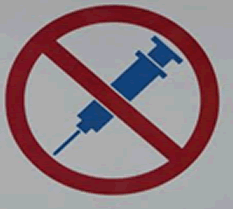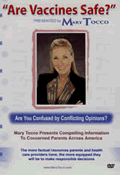PART 1 of 2
By Rob Pell
December 3, 2013
NewsWithViews.com
Vaccine use has skyrocketed in the last 30 years. Speak with virtually any medical doctor and they're more than happy to provide a long list of reasons they think children should be vaccinated. Current American Academy of Pediatrics recommendations state that children should receive 24 vaccine doses by the age of 15 months and 49 doses by age 6.
Included
in those recommendations, the medical establishment even  recommends
that parents begin vaccinating their children the day they're born
for a disease, Hepatitis B, that is transmitted sexually or thru shared
needle use. Who knows why? Because the misinformation surrounding
vaccination is so extensive, many parents don’t even question
whether or not they should vaccinate their child. However, parents
should view these as very major decisions. The lifelong health
and well-being of their child may depend on the critical decisions
parents make in this area.
recommends
that parents begin vaccinating their children the day they're born
for a disease, Hepatitis B, that is transmitted sexually or thru shared
needle use. Who knows why? Because the misinformation surrounding
vaccination is so extensive, many parents don’t even question
whether or not they should vaccinate their child. However, parents
should view these as very major decisions. The lifelong health
and well-being of their child may depend on the critical decisions
parents make in this area.
A logical look at disease and vaccine statistics may surprise many. Unfortunately, most people are not exposed to all the facts before they're convinced to inject vaccines. In every mature decision we make in life we need to consider two things: The potential upside gain, if all goes well, verses, the possible down-side risk.
To be as logical and clear as possible, let's study this important subject in four basic parts:
1-
History of vaccines
2- Effectiveness: Have vaccines been proven to work?
3- Safety: What are the likely or potential unwanted
side-effects?
4- With or without vaccines, natural ways to safely
enhance immunity.
5- Conclusion
History of Vaccines
The term vaccine comes from vacca, the Latin word for cow. In 1796 the first modern vaccine was created when diseased infectious material from cow pox, a disease affecting cow's udders, was injected into humans to protect them from smallpox. Unfortunately deaths from smallpox rose dramatically about 20 years after the vaccine became compulsory.
In the US and England, the death rate from Pertussis (whooping cough) dropped from about 60 deaths per thousand in the mid 1800s to about 2 per thousand in the early 1950s, even before the Pertussis vaccine was used. Deaths from measles from the mid 1800s until the 1963 introduction of the measles vaccine fell at a nearly identical rate. In both cases, even before the introduction of the vaccines, the death rate from these diseases had already fallen approximately 97%.
According to international mortality statistics, in the 30 years before the first polio vaccine was invented, the polio death rate had already dropped about 50% in the US and England. However, in the year immediately following the introduction of the polio vaccine, the death rate from polio rose significantly.
Government statistics reported by the Associated Press in 1955, the year after the polio vaccine was invented and widely administered, stated the death rate from polio increased,on average, 530% in the states of Vermont, New Hampshire, Massachusetts, Connecticut and Rhode Island. Fortunately the rate later continued on the downward trend that began decades before the vaccine was introduced.
Polio has since essentially disappeared in the US and throughout Europe, even in the European countries that had no mass vaccination programs. Internationally respected pediatrician, Dr. Robert Mendelsohn believes that the disease simply ran it's course.
The 1850s appear to be the turning point when death rates from many infectious diseases began to drop sharply. I think this is directly related to 2 important milestones. Based on groundbreaking research from Hungarian physician, Dr. Ignaz Semmelweis, and later confirmed by Luis Pasteur and Joseph Lister, doctors became aware of the life saving benefits of washing their hands between patients. Then around 1900, municipalities began disinfecting drinking water. When these 2 aspects of basic modern hygiene became the norm, data clearly demonstrates death rates from infectious diseases plummeted, long before most vaccines were introduced.
Research from 1913 Nobel Prize winner in medicine, Dr. Charles Richet, demonstrated that hay fever, asthma, anaphylactic shock and other inflammatory allergic reactions were often caused by reactions to undigested proteins in the bloodstream from injected vaccines. Ask your doctor if she has even heard of this groundbreaking, 100 year old research. Then ask them why they were never taught about Richet's work in medical school. The answer is: because Big-Pharma doesn't want it taught.
Some researchers now believe that trace proteins from peanut oil, a common ingredient in many vaccines, is the likely cause of, otherwise unexplained, deadly peanut allergies. This explains why children who have never before eaten peanuts can experience deadly reactions the first time they eat the food. It's also totally consistent with Richet's discoveries.
Like Richet's Nobel winning research, unbiased studies from qualified researchers are desperately needed so the general public and medical communities can get accurate data on which to base informed vaccine decisions.
Vaccine Effectiveness, Do They Work?
Because vaccines are used predominately on our children, most people assume that all vaccines have been subjected to thorough trials and rigorous studies proving that vaccines are effective and safe. Parents have wrongly been told, as demonstrated in the history portion above, that mass vaccination campaigns ended multiple epidemics around the world.
However, taking the time to logically review pro-vaccine assertions, we find that they lack solid scientific backing. Not only has there never been a single long-term scientific study comparing the health and welfare of vaccinated to unvaccinated children, multiple examples can easily be found of vaccinated children acquiring the very illness they have been vaccinated against.
Even if parents find out about the risks of vaccines on their own, their doctors usually assure them that the risk is worth the almost certain, alleged benefit of freedom from infectious disease, that their child supposedly receives. However, time and again, vaccines have simply not worked against the diseases they are targeted to prevent.
A 1978 survey of 30 states showed that more than half of all children who contracted measles had been fully vaccinated. Sweden abandoned its whooping cough vaccine after it examined 5,140 cases of whooping cough in 1978 and found that 84 percent had been vaccinated three times. A 1990 Journal of American Medicine Association article stated that "Although more than 95 percent of school-aged children in the US are vaccinated against measles, large measles outbreaks continue to occur in schools and most cases occur among previously vaccinated children." The medical literature is filled with example after example of the failure of vaccination to furnish protection against common childhood diseases.
Many laypeople and physicians look to the National Center for Disease Control (CDC) in Atlanta for definitive answers about health issues including answers to questions about vaccines. Below is a verbatim answer from the CDC website to the straightforward question:
How Effective Is The Flu Vaccine? The Answer Is Directly From The CDC Website: “At least two factors play an important role in determining the likelihood that flu vaccine will protect a person from flu illness: 1) characteristics of the person being vaccinated (such as their age and health), and 2) the similarity or "match" between the flu viruses the flu vaccine is designed to protect against and the flu viruses spreading in the community. During years when the flu vaccine is not well matched to circulating viruses, it’s possible that no benefit from flu vaccination may be observed. During years when there is a good match between the flu vaccine and circulating viruses, it’s possible to measure substantial benefits from vaccination in terms of preventing flu illness. However, even during years when the vaccine match is very good, the benefits of vaccination will vary across the population, depending on characteristics of the person being vaccinated and even, potentially, which vaccine was used.”
To sum up their answers: There is no way for a doctor or layperson to know if the flu shot being administered matches up with the flus that are actual threats in any given year. The years when it doesn't match up, it will provide zero benefit.
CDC says scientific testing of flu shot effectiveness would be unethical. The CDC claim that years when the vaccine matches up with the actual flu threat, “it's possible to measure substantial benefit”. Notice they don't say benefit has been measured. The only way benefit could be scientifically be measured would be with a placebo controlled double blind study, ie. administer the vaccine to some while administering a placebo to a statistically similar control group. The CDC website states that studies of this type are not done because it would be unethical to deprive some people of the flu vaccine. Further, they don't define the words substantial benefit. Would a substantial benefit be a 5, 10 or 60% reduction in flu cases? They don't say and the intelligent among us are left guessing what they might be implying.
The CDC website further states that: “In general, the flu vaccine works best among healthy adults and children older than 2 years of age. Reduced benefits of flu vaccine are often found in studies of young children (e.g., those younger than 2 years of age) and older adults (e.g., adults 65 years of age and older).”
They have to say in general, because they have no definitive studies. But it's ironic that, if there is any benefit at all, people most at risk from a serious flu complications, the elderly and the very young, are the ones who can expect the least benefit. And any possible benefit would only occur during years when the vaccine and the flu are a match. But, since for so-called ethical reasons, they won't do any truly scientific testing, we'll never know if any of their theories have any validity at all.
From another so-called authoritative source, The National Network For Immunization Information, the answer to the simple question:Because of better hygiene and sanitation, hadn’t diseases already begun to disappear before vaccines were introduced?
Answer directly from their website: “No, they had not begun to disappear. In the 20th century, infectious diseases began to be better controlled because of improvements in hygiene and sanitation (clean water and pest control). However, the incidence of vaccine-preventable diseases only began to drop dramatically after the vaccines for those diseases were licensed and began to be used in large numbers of children”
Their answer directly contradicts all official public health data available which clearly demonstrates that many diseases that vaccines were created to eliminate had already been reduced by 97% before the vaccines were even invented. Plus, after reading their answer, any thinking person would have to ask the question: why would improvements in hygiene and sanitation improve all diseases except those that are “vaccine-preventable.” Their assertions don't pass a basic sniff test and are equal parts asinine, sad and possibly criminal, if we traced their funding sources.
| Subscribe to the NewsWithViews Daily News Alerts! |
The experts have confusing, convoluted answers inconsistent with accepted historical data But rather than accept the possibility that the system of vaccination could be seriously flawed, the medical industry simply calls for "booster" shots and re-vaccination, without any solid, long-term studies to see whether immunity is actually achieved and, if so, for how long.
So if you are trying to do your own risk\reward analysis about whether or not to vaccinate, are you really sure what the reward is? The CDC certainly isn't and they claim it would be unethical to do scientific studies to find out. For part two click below.
Click here for part -----> 1, 2,
Resources for more information:
1- The National Vaccine Information Center (NVIC)
Two of the most well researched and comprehensive books I've found on the subject are:
2- Vaccines, Are they Really Safe & Effective? By Neil Miller
3- What About Immunizations? Exposing the Vaccine Philosophy By Cynthia Couurnoyer
© 2013 Robert Pell - All Rights Reserve
Rob Pell
owns and operates Sunshine Natural Foods in Grants Pass, Oregon and
has 35 years experience helping people with natural foods, products,
 exercise
and healing.
exercise
and healing.
Website: Sunshine Natural Foods
E-Mail: RobertPell9@gmail.com










 Share This Article
Share This Article




